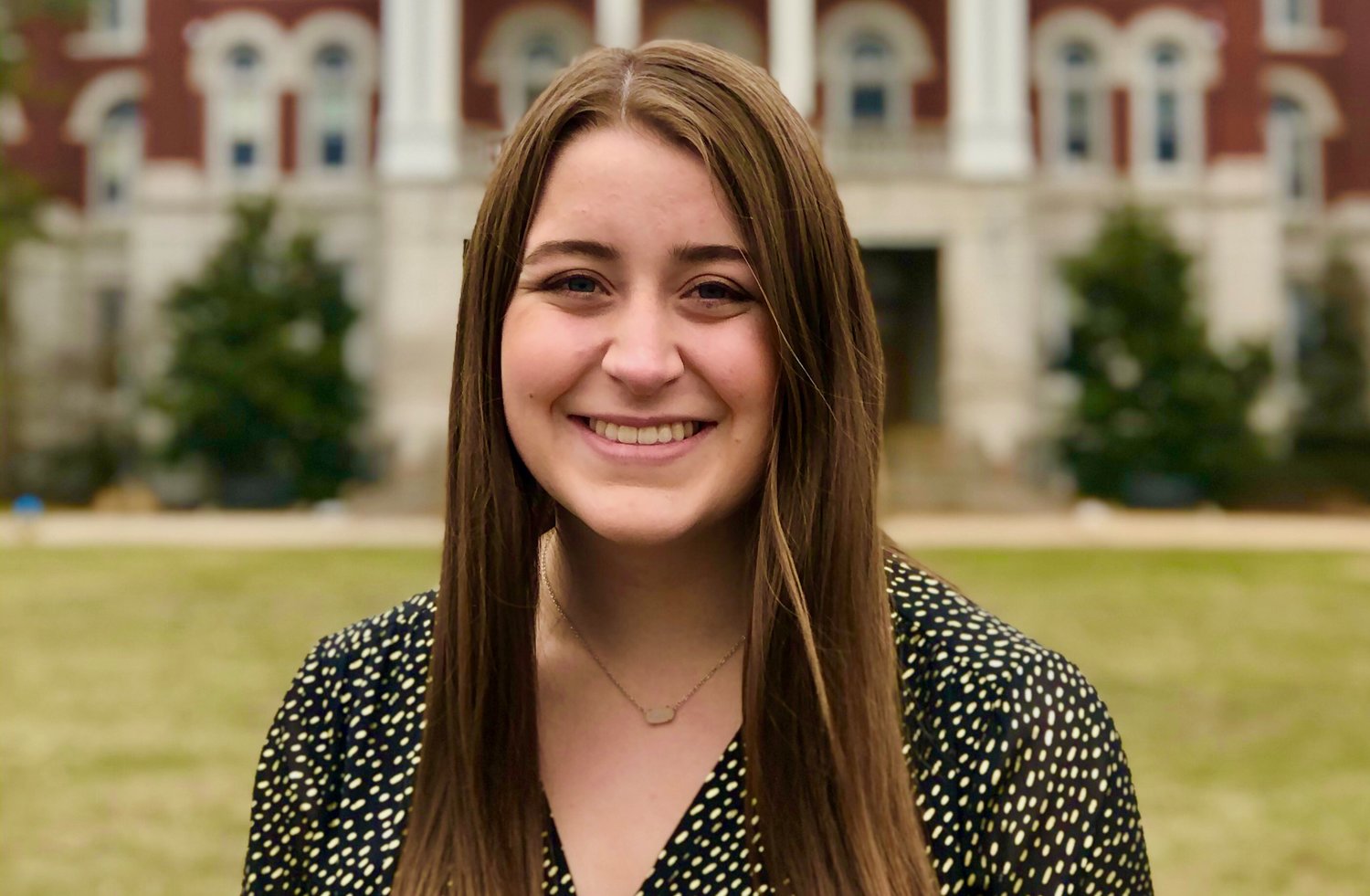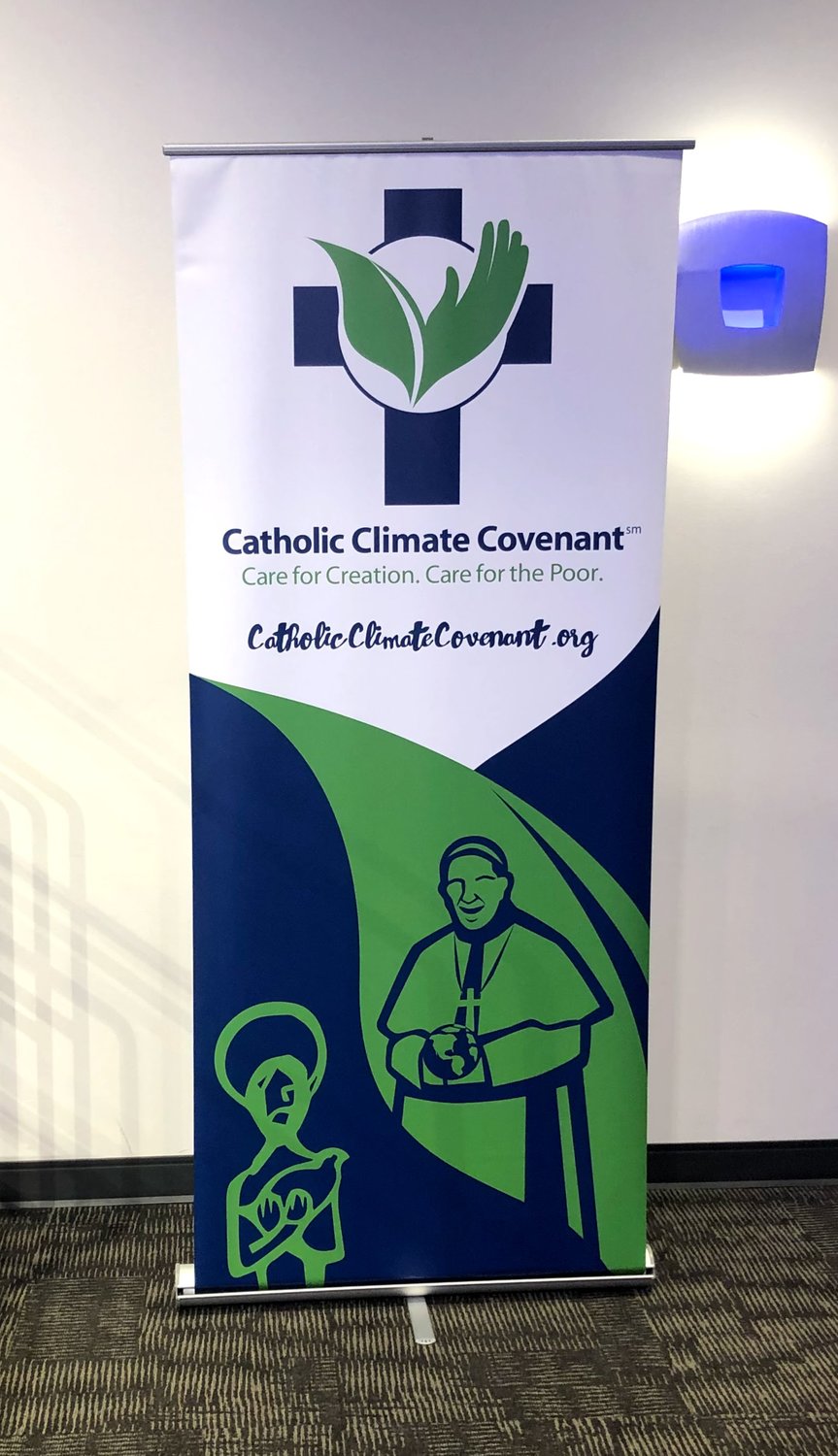Student helps organize virtual conference on care for creation
Promotes simplicity, sustainability and spirituality among friends on campus

Emma Heienickle sees people all around her seeking fulfillment in the college party culture, perpetual Instagram worthiness and other empty pursuits.
She has chosen the better part and will not be deprived of it.
“What I have found is true satisfaction,” said Ms. Heienickle, an environmental and atmospheric science major at the University of Missouri in Columbia.
“If you’re searching for happiness, for joy, for peace, search in God,” she said. “He will provide all of that for you.”
Kinship with God is a priceless gift.
“We are truly loved because we are His daughters and sons,” Ms. Heienickle noted. “There is nothing we have to do to earn it from Him. It is freely given. He shows us that on the cross.”
Taking all of this to heart tends to lead to a countercultural life and an ongoing dying-to-self.
“But in doing that,” said Ms. Heienickle, “in dying to ourselves, we come to new life, just as in the Resurrection, truly find the joy and happiness that He intends for us.”
Ms. Heienickle has made a commitment to live simply and sustainably, in keeping with centuries of Church teaching and Pope Francis’s encyclical, “Laudato Si’: On Care for Our Common Home.”
“We don’t need a lot of material things to be happy,” she asserted. “If we place our lives in God’s hands and in the hands of our family and friends, and we do things out of love, that’s what’s really going to satisfy us as disciples in Christ.”
In “Laudato Si’,” Pope Francis teaches that care for creation is an essential aspect of discipleship, a holy response to being entrusted with a tremendous gift.
“That’s often forgotten,” said Ms. Heienickle. “The world is a gift.”
In the encyclical, the pope calls for nations, cultures and economies to be reoriented toward respect for and active protection of the natural environment, rooted in a sacred relationship with God and His love for all people.
“It really is this full-circle effect, not just ‘care for flowers because they’re pretty,’” Ms. Heienickle noted. “It is necessary in order for all of us to live to our fullest potential.”
God makes everything possible through His revealed wisdom and infinite love.
“It’s really important to recognize that,” Ms. Heienickle stated. “To live lives of love requires us to care for creation.
“Being pro-life means caring for the fullness of dignity of every single person,” she said. “If people don’t have access to clean water, or if they live near a factory that is polluting the environment, they cannot live their lives in the way God intends.
“If we care for creation, people will be able to have just lives, which is ultimately what we’re called to do,” she said.
Path to encounter
Ms. Heienickle grew up in a Catholic family near St. Louis and went to Catholic schools.
She joined the “Earth Angels” high school environmental group at St. Joseph’s Academy.
“I saw how rooted in our Catholic faith the care for creation is, and how many other things are impacted by how we care for our environment,” she said.
Recognizing Ms. Heienickle’s passion, the Earth Angels’ faculty moderator gave her a copy of “Laudato Si’,” which she studied intently.
Ms. Heienickle decided to major in environmental and atmospheric science in college, combining her convictions of faith and with science’s potential “to help people see a reason to care about and be concerned about our common home.”
She became active at the St. Thomas More Newman Center and fell deeply in love with her faith.
“College was the first time I had to make my own decision to show up for Christ,” she said. “That willingness to learn more about myself and to give of myself and realize that my life is not my own, that whatever God wants me to do is what I want to do. ...
“That willingness, that ‘Fiat’ that Mary said to God’s will when she said ‘yes’ to having Jesus — I desire that same attitude in my life, to live a life that will bring me into deeper relationship with God, even if I do things that are not what society expects,” she said.
She resolved to attend daily Mass, spend an hour with Jesus in Adoration every day and initiate conversations with friends about the importance of living sustainably, caring for others and working toward lasting change.
She also began taking frequent “Rosary walks” through nature.
“These are beautiful ways I can devote my heart more to the Lord and grow in relationship with Him,” she said.
Conference call
Ms. Heienickle recently helped organize a three-day virtual conference titled, “Laudato Si’ and the U.S. Catholic Church: A Conference Series on Our Common Home,” sponsored by Creighton University in Omaha and the Catholic Climate Covenant.
Its purpose was to help participants explore various aspects of the pope’s encyclical and every Christian’s responsibility to live in right relationship with God, other people, especially the poor, and the glorious web of ecosystems that support all life on this planet.
A husband and wife in St. Thomas More Newman Center Parish helped her attend her first Catholic environmental conference at Creighton University in Omaha two years ago.
“It was unlike anything I had ever experienced before,” she recalled. “It was fun to network with everyone who had been in these careers for such a long time — working in parish life and with schools and campus ministry.
“It was really good to hear their perspectives on the connection between our faith and care for creation,” she said.
She was the youngest person there.
“There was a distinct feeling of, ‘Why aren’t there more young people here?’” she recalled.
That conference solidified her ambition to share her passion for her faith and her academic studies, “with faith, love and kindness.”
The organizers of this year’s conference, held virtually due to the COVID-19 pandemic, challenged her to help invite more people her age to attend.
She helped lead the college track for the conference, focusing on themes of eco-spirituality, sustainability and simple living, along with environmental advocacy, service and justice.
“It’s been a joy to spend time with people who have this passion to work for the environment, bring clean air and water to people who need it, and help them live lives that are worth living,” she said.
Respectful dialogue
Ms. Heienickle is a member of a sorority on the MU campus and has a large circle of friends and acquaintances.
She’s committed to engaging in patient dialogue with people who don’t understand her spiritual or earthly pursuits.
“I try to approach each situation with love and with grace and truly try to understand their side of the story, their perspective,” she said.
“Their journey is valid, and it’s their journey,” she insisted. “I just need to go in and love that person how they need to be loved, how they are meant to be loved.
“That’s how Jesus did things. He would act with love.”
She is aware of the Gifts of the Holy Spirit at work in her, especially fortitude, “which is basically the gift of courage.”
“I’m not saying it hasn’t been difficult,” she said. “I’ve had some difficult conversations with people and have lost friends from the way I’m living now.”
“But I have to trust the Lord’s plan for me that He will provide,” she said. “The journey is hard and long but it’s also good, it’s already really fruitful.”
Into the deep
Upon graduating, Ms. Heienickle plans to put her degree to use doing research to help uncover the next steps in the climate change process.
“I hope to be doing research about the climate and working on sustainability issues,” she said.
She noted that climate change relates to many other fields of study, including social sciences and education.
“And faith!” she declared. “So I want to be doing something from a Catholic perspective and educating people in the importance of learning science and applying our faith to it.”
For anyone who’s interested in drawing closer to God in simple ways, Ms. Heienickle suggests going to daily Mass and starting with 15 minutes a day of uninterrupted prayer.
She also suggests taking prayer walks through nature and pursuing opportunities to serve in the community.
“Once a month, you could perform an extra day of service,” she said. “Whether that be yard work for a neighbor who can’t do it anymore, or going to volunteer at a nearby soup kitchen, or getting into your community and learning about people and having a relationship with them — just getting out and trying to understand people, even that is an indirect way to evangelize.”
She also suggested pondering the passage from Mark about Jesus calming the storm (4:35-41).
“Think about accepting Jesus into your life, accepting Him onto that boat, following truth, following Jesus, stepping out of our comfort zone, doing what is hard — but ultimately, the storm will calm,” she said.
CLICK HERE to read a related article in the St. Louis Review.
Comments
Other items that may interest you
Services
The Catholic
Missourian
2207 W. Main St.
Jefferson City MO 65109-0914
(573) 635-9127
editor@diojeffcity.org







